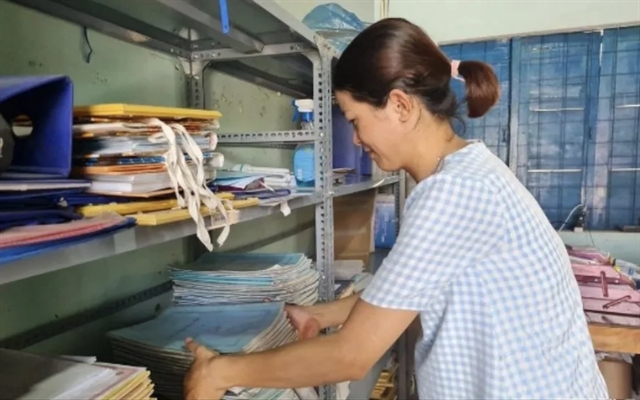 |
| A librarian in a secondary school in Đắk Lắk Province. Photo giaoducthoidai.vn |
Nguyễn Thị Ngọc Hường had worked as a contract librarian at a public school in Duy Tiên Township, in the northern province of Hà Nam, since 2010 and only became a civil servant in 2022.
After dedicating 14 years to her job, her current income, after deducting insurance, is VNĐ4.6 million (US$180) per month without any additional allowances. This meagre salary makes it challenging for her to make ends meet. [According to the General Statistics Office the average income of working people in the first half of 2024 was VNĐ7.5 million (nearly US$300) per month.]
She has to take extra work as goods shipping, farming work and selling goods online in her spare time to support her family, However, they depend mainly on her husband’s freelance business for their livelihood and their two children’s education.
“Besides our main duties in keeping and lending books, we also facilitate teachers and students to access information and resources in the library, particularly handle tasks typically assigned to teachers,” Hường told giaoducthoidai.vn.
“These include planning lessons and handling administrative work. In some places, we are involved in literacy campaigns, medical care duties, assisting with lesson planning, and supporting teachers during special lessons and teaching competitions,” she added.
Giving up halfway
Busy work and low income have discouraged many school librarians.
“In fact, my job as a librarian is harder than that of a teacher because I have to simultaneously teach life skills and moral lessons, and organise reading activities in classrooms, the library room, and even during outdoor break,” Phạm Thị Chiêm, a school librarian in Thái Bình Province, said.
“We also inspect students’ books, stationery, and monitor their study habits on monthly basis.”
Meanwhile, Lê Thị Ngọc, a school librarian in Vĩnh Lộc District, Thanh Hóa Province, commutes nearly 50km daily from home to school and back for about three hours, which is especially challenging during bad weather. Working eight hours a day at school, and caring for three young children at home, she finds no time to take extra work. Her husband is also a government worker with low income, so her family’s finances are often unstable.
“Ten years ago, I considered quitting my job at school, but my parents encouraged me to stay, valuing my education and years of dedication,” Ngọc said.
“I tried to live frugally on my small salary. In early 2023, facing health issues, stagnant wages, and rising costs as my children grew, I reluctantly submitted my resignation. It was heart-wrenching to leave after 18 years of devoted service,” she said.
Currently, there are over 35,000 school librarians nationwide. Although government policies to improve the living of educational workers exist, they have not been effectively implemented, leaving many unable to sustain themselves on their salaries.
Delay in applying policies
 |
| The work of a school librarian includes guiding students in reading books at the library. Photo giaoducthoidai.vn |
Despite regulations from the Ministry of Home Affairs, the Ministry of Culture, Sports and Tourism, and the Ministry of Education and Training (MoET), school library staff still receive no additional income beyond their basic salary. This situation has led to financial difficulties and frustration among this workforce.
The Ministry of Culture and Information (now the Ministry of Culture, Sports and Tourism) issued a circular in February 2006 stipulating these allowances and in-kind benefits for public servants in the cultural information sector.
The Hà Nam provincial Department of Education and Training sent an official dispatch to the People’s Committees [administrations] of districts, towns, and cities on May 6, 2024, urging them to direct relevant agencies and public educational institutions under their jurisdiction to implement existing regulations on allowances for school staff, ensuring correct subjects and levels of allowances based on job positions.
On October 30, 2023, MoET issued a circular providing guidance on job positions, the structure of public employees according to professional titles, and staffing norms in general education institutions. The funding source, calculation, and payment of these allowances should follow the instructions provided in the relevant documents issued by the managing ministries and current state regulations.
The department also required affiliated units to thoroughly study the regulations regarding subjects, levels of allowances, calculation methods, and payment procedures for employees. Based on the actual tasks assigned to employees in each unit, the correct subjects and levels of allowances should be identified and implemented, ensuring appropriate payment of preferential, responsibility, hazardous, and dangerous allowances as per regulations.
“In fact, the work of librarians is somewhat like that of teachers; we also have to prepare specific content to organise a reading period as a lesson plan before class,” Hường said.
Librarians must write professional essays introducing the role of the school library in serving teaching and learning, and numerous articles introducing books on various subjects to readers, requiring didactic skills.
“Despite these guidelines, Hà Nam Province had not paid the allowance payments for library staff by the end of May 2024; even MoET issued an official dispatch on December 26, 2023, regarding the implementation of policies and promotion of professional titles for school staff,” she added.
The delay and inconsistency in applying these regulations have left many librarians struggling financially and professionally. There is a pressing need for concerted efforts from all relevant authorities to ensure that policies are not only well-documented but also executed efficiently to support and motivate this essential workforce.
According to Vũ Minh Đức, PhD, director of the Department of Teachers and Educational Managers at MoET, the ministry has acknowledged the significant difficulties faced by school staff.
Currently, the total income of school staff, including insurance contributions, for those with less than 15 years of service ranges from VNĐ3.6 million to under VNĐ7 million per month, Đức said. This is despite the large workload and the necessity to take on various additional tasks.
To help school staff increase their income, stabilise their lives, and feel secure in their roles, the education ministry has proposed to the Ministry of Home Affairs that school staff receive a professional allowance at an appropriate level to recognise their work and responsibilities.
They also aim to review and assess the complexity of each job position held by school staff, which will serve as a basis for adjusting regulations regarding job responsibilities, professional standards, and professional rank classifications. These adjustments aim to improve income through salary enhancements and provide better career advancement opportunities for school staff.
The stories of Hường, Chiêm and Ngọc reflect a broader issue facing school library staff across Việt Nam. Despite their important role in education, their work remains undervalued and underpaid, leading to financial hardship and job dissatisfaction. Addressing these issues requires concerted efforts from government authorities to ensure fair compensation and support for these dedicated workers. VNS
- Reduce Hair Loss with PURA D’OR Gold Label Shampoo
- Castor Oil Has Made a “Huge” Difference With Hair and Brow Growth
- Excessive hair loss in men: Signs of illness that cannot be subjective
- Dịch Vụ SEO Website ở Los Angeles, CA: đưa trang web doanh nghiệp bạn lên top Google
- Nails Salon Sierra Madre
 VnExpress News The News Gateway of Vietnam
VnExpress News The News Gateway of Vietnam





